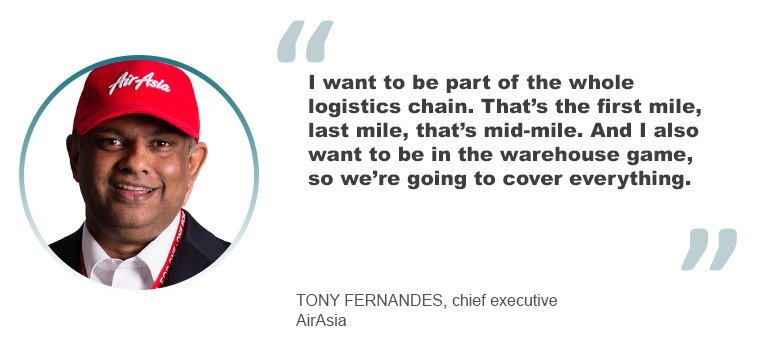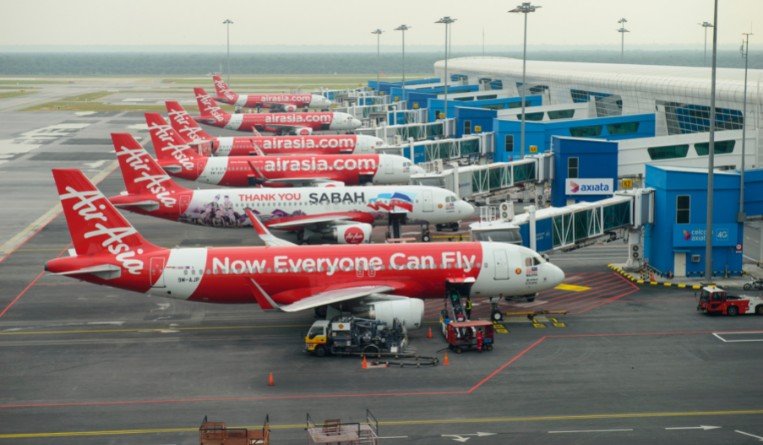Multinational low-cost airline AirAsia is looking to enter the logistics industry to offer “first mile to last mile” services, with its chief executive Tony Fernandes saying that the carrier also wants to do warehousing.
Speaking at the CAPA Live event in July, Fernandes said he is going “full on” into logistics.
“I want to be part of the whole logistics chain,” the AirAsia Group CEO said. “That’s the first mile, last mile, that’s mid-mile. And I also want to be in the warehouse game, so we’re going to cover everything.”
Fernandes said AirAsia will offer air cargo “but be more of a direct source to the freight forwarders” or serve as a freight forwarder for some companies.
“We [want to] handle everything from the first mile to the last mile, including warehouse. Be a courier, get all our planes up in the air,” he added, adding that “there’s no one that can really match us in terms of speed in Southeast Asia, and be an e-commerce provider.”
His aim is to do cargo operations in a similar way as “what we did with passengers: eliminate the middleman.” As part of this, he noted that AirAsia began to deal more with freight forwarders, then direct customers. At the same time, Fernandes said AirAsia “consolidated all [its] space across all the airlines.”
“We don’t just want to be a piece of it, we’re going to be all of it, so that we can provide an integrated solution. We want to be totally integrated,” the AirAsia CEO added.
“And apart from DHL and FedEx, who really made their money from courier stuff, as opposed to a lot of stuff, there’s no one really in it,” Fernandes said.
“Cargo could be powerful as passenger services”
Fernandes, whose AirAsia has long been a major player in the low cost carrier market in Asia, also noted that as the Covid-19 continues to ground passenger planes, cargo has become a “diamond in the rough” for the industry.
He said prior to Covid-19, AirAsia already began seeing the “e-commerce revolution” – which prompted the creation of Teleport, the logistics venture of Airasia Digital. “When Covid hit, we accelerated these plans as e-commerce was driven to another level,” Fernandes said. “Air cargo has become much more expensive or much more valuable.”
“What was kind of nice to have has become something that could be as powerful as our passenger services, and is a bit of a diamond in the rough,” the AirAsia chief said of air cargo operations. “I never thought we’d have freighters. I never thought we’d be taking seats off the plane to do cargo.”
AirAsia, which operates scheduled domestic and international flights to more than 165 destinations across 25 countries, launched Teleportin 2018. Since launching door-to-door delivery services in 77 cities in five countries by the end of 2020, Teleport noted that it has delivered cargo and other consumer products in under 24 hours on two-way routes between Kuala Lumpur and Singapore, Kuching and Kota Kinabalu.
In June, AirAsia said the e-commerce market is “expected to gain further momentum” and is expected to amount to “over 3 billion users” in Asia alone by 2025.
But Fernandes cautioned about the longevity of the current market dynamics.
“There is a false market out there, so we shouldn’t all get carried away, because [the return of] belly space is going to change the economics again,” he said, although noting that the freight business is “no more a stepchild” for carriers, unlike in the past.
“We’re cautious,” Fernandes said. “But we do think it’s no more a stepchild. Cargo is going to be a big part of our business.”
“[In the past], you never hear the CEO saying, ‘I've just bought 20 freighters.’ They’re all talking about their passengers,” he continued.
“So, I think Covid will change that a little bit. It’s not seen as a glamorous side of the business, but it’s going to be a very important part of the business,” the AirAsia chief added.
The continued growth in the freight operations of AirAsia via Teleportwill be boosted by the addition of the company’s first dedicated freighter, a Boeing 737-800F, and by the conversion of two AirAsia A320 passenger aircraft, with seats removed for increased capacity of freight and cargo delivery in Q3 2021.
Fernandes: “We’re still very much alive”
Meanwhile, the AirAsia chief said regional travel will recover sooner than long-haul – and local business travels will pick up with a much-needed boost from e-commerce.
“Prior to Covid, I think business travel was already going down,” Fernandes said. “I think intercontinental travel is going to take a hit for a while, [but] it will come back. But I think long-haul hub carriers will not recover as quickly as low-cost carriers, not because we’re better, but just because the market is going to change.”
Despite the disruptions to travel and the wide-ranging impact of Covid-19 to aviation, Fernandes lauded the resilience of the industry, as he expressed optimism that the industry will bounce back eventually.
“The good news is most airlines are still alive,” the AirAsia chief said. “That’s impressive. A few have gone into bankruptcy protection and stuff, but most airlines are still alive. All LCCs in Southeast Asia are still alive. So that’s good news.”
“Second good news is – every single person I see, can't wait to get on a plane. I never had that before,” Fernandes added. “I’m happy – competitor or no competitor, the airline industry is still more or less, in the state. It’s good news that United’s buying planes again. It’s good news that Airbus is talking about an uplift in orders.”
He continued: “So good news is number one, we’re alive, and number two, people want to travel. We’re not the stagecoach industry, we’re still very much alive.”




